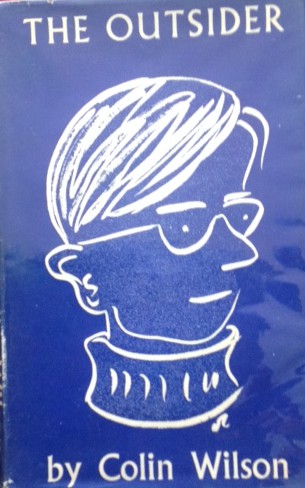Inspiring Older Readers
 posted on 21 Mar 2016
posted on 21 Mar 2016
The Outsider by Colin Wilson
Colin Wilson died at the age of 82 in 2013 and although he went to his grave believing that he was "the major literary genius of our century" (a quotation taken directly from his diaries), the majority view was that he had become something of a literary misfit, even an outsider. The irony of this will not, of course, go unnoticed by those of us who associate his name with his first and his possibly only enduring book of literary and cultural criticism which he entitled The Outsider.
Originally published in 1956, Wilson’s book caused something of a stir. Aged only 24 when it came out, it evidenced a short life of prodigious study which ranged over a breadth of reading that would not have put a man twice his age to shame. Add to the mix the ‘romance’ of its production ( supposedly written in The British Museum while sleeping rough on Hampstead Heath) and its subject matter ( the spiritual alienation of the modern man) and there was enough there to capture a critical moment. Copies of the book flew off the shelves and Wilson found himself an overnight literary sensation.
It is certainly true that the timing of the publication of The Outsider was critical. In many ways it captured the change that was taking place in the intellectual and cultural atmosphere of post-war Britain. Here was another iconoclastic young man (another Angry Young Man?) emerging to challenge the rather stuffy image of the literary establishment and seeking to showcase the kind of literature that had been seen as ‘cultish’ or ‘alternative’ – a sort of literary beatnik who would help pave the way for the counter-cultural 1960s.
In modern day parlance, the book had a vibe about it – something it had retained when I first picked it up in the early 1970s. I have to be honest and say that I didn’t really get the full gist of Wilson’s thesis when I first came to it and, in truth, I used the book more as a source or road-map to the other books he wrote about. The idea that this was a ‘hidden’ or even ’forbidden’ cache of literature that at the very least was likely to be frowned on by traditionalists excited my imagination in a way that I now find mildly embarrassing to admit.
Going back to it all these years on and in the knowledge that Wilson’s career spiralled very quickly onto the margins of the esoteric and the frankly loopy, I approached the reading of it in a very different frame of mind. So, I was surprised to discover that the frisson of excitement is still there – dim but undoubtedly alive. The book is well written in that Wilson’s evident sense of revelation vitalises the pages and makes the book crackle with expectation. Although I’m much more familiar now with the roster of authors he addresses, I can see easily how I was pulled into the dazzling spotlight he throws on some pretty obscure stuff.
The problem for me now lies in the central proposition of the book. Wilson’s idea that the only effective and principled challenge to the spiritual malaise of the twentieth century is to be found in authors ( and selected artists) who are prepared to confront the core manifestations and causes of social and spiritual alienation simply lacks coherence. Who gets included as an ‘outsider’ feels random and you are left thinking that on Wilson’s criteria, a case could be made for anyone to be categorised in this way. Hell, if Henry James writes outsider fiction, who doesn’t?
Terry Eagleton writing about Wilson’s book back in 2013 is largely kind to it in terms of its impact on him as a young man but makes this telling assessment:
“The Outsider is a ragbag of modish nihilism, ranging from Camus, Sartre, Hermann Hesse and TE Lawrence to Blake, Van Gogh, Nietzsche and Dostoevsky. TS Eliot rubs shoulders with Vaslav Nijinsky, and Ernest Hemingway sits cheek by jowl with Franz Kafka. Most of the figures it deals with have absurdly little in common with one another. It is just that the pure Romantic cliche of its main argument – that some artists feel alienated from mainstream society – is nebulous enough to apply to almost anyone who lifts a paintbrush or a pen, including at a stretch the anonymous author of the Rupert Bear annual. It is the kind of book you might expect from a gloomy autodidact who had been locked for some months in a second-hand bookshop.”
How astute that is. My only point of disagreement is that I don’t find the book a product of a gloomy mind – an overheated one certainly, but gloomy, no. The fact that Wilson is clearly driven on by his insights is what gives it power and it is also that which makes it a young man’s book – both from the point of view of authorship and readership.
I’m glad I’ve read this again even if it’s only to remind me of the books I had completely forgotten about and which may be worth another look. Wilson died a deluded figure in terms of his significance to the wider reading public but he did light a small flame in me and that’s something I wont forget.
Terry Potter
March 2016